The Faculty of Arts honors the journalist Muhammed El-Baz in the seminar " analysis of the current media scene and its repercussions"
The Faculty of Arts, Ain Shams University, represented by the Department of Oriental Languages, organized a seminar entitled: “Reading in the Current Media Scene and Its Repercussions,” during which it hosted Dr. Mohamed El-Baz, the journalist and media writer and Chairman of the Board of Directors of Al-Dustour newspaper, and a professor of journalism and media at the Faculty of Mass Communication, Cairo University.
The seminar was held under the auspices of Prof. Dr. Mahmoud El-Matini, President of Ain Shams University, Prof. Dr. Abdel Fattah Saoud, Vice President for Education and Student Affairs, Prof. Dr. Lotfi Mortada, Dean of the Faculty, and the supervision of Prof. Dr. Rania Mohamed Fawzy, Head of the Department, and the meeting was moderated by Dr. Saeed Al-Sabbagh, coordination and preparation d. Ahmed Lashin, and the seminar witnessed a large student turnout.
The seminar began with a call to observe a minute of silence for the souls of the nation's righteous martyrs, who gave their lives for the nation and the Egyptian people.
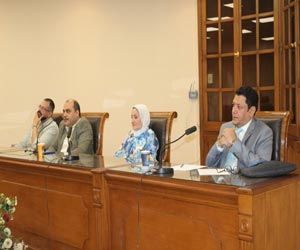 |
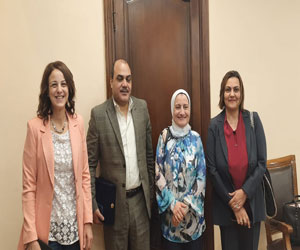 |
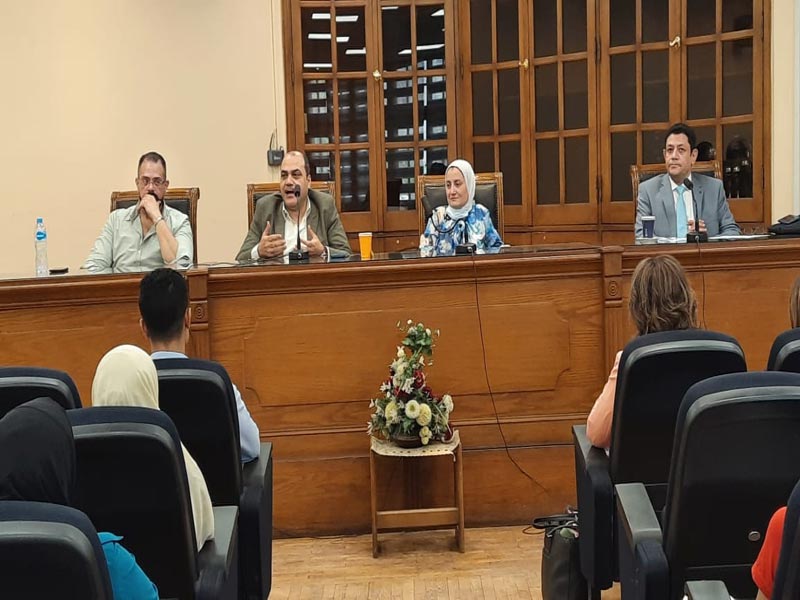 |
||
Prof. Dr. Mustafa Mortada, Dean of the Faculty, Dr. Muhammad Al-Baz and all the attendees, praised the good selection of the topic of the seminar, explaining that the current media scene is ambiguous due to daily global changes. As there is a difference between ideology and action on the ground.
Then, Dr. Ahmed Lashin, defined the value of d. Muhammad Al-Baz, his journalistic school, and his national role in the field of media, and pointed out the importance of hosting prominent elements in the community, inside the Faculty campus, to present a successful model for students in various disciplines. The choice as a documentary drama, clarifying the concept of media neutrality and patriotism, and the concept of sensational journalism, and whether it contradicts the role of the press and media in spreading facts.
Prof. Dr. Rania Mohamed Fawzy, head of the Department of Oriental Languages and the supervisor of the seminar, stressed the need to activate cultural activities in the Faculty of Arts, so that students can engage with the issues of the society around them, and praised the role of Dr. Muhammad Al-Baz in the field of journalism and media.
She also stressed that taking sides in times of danger besetting the homeland is the pinnacle of neutrality, and otherwise it is treason.
In turn, the journalist and media writer, Dr. Muhammad Al-Baz said that Egypt has been living in an exceptional period since 2011, and the media had to realize the requirements of the stage, especially increasing the political awareness of society, and trying to prevent any sabotage inside the country.
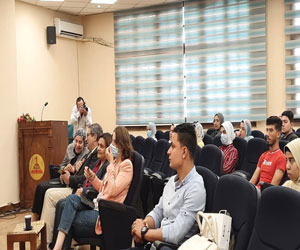 |
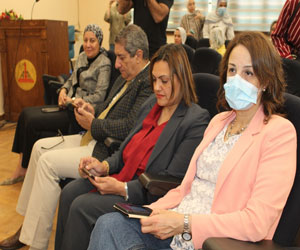 |
Then came the stage of the rule of the terrorist Brotherhood, in which the press fought a fierce battle that needed a special nature. Al-Baz indicated that his position was clear from the beginning of the Brotherhood’s stage, and it is the position of opponents to their rule, a position that he and other journalists presented to strong clashes against the Brotherhood up to the June 30 revolution.
Since that stage, what is known as the anti-state media and the Egyptian society as a whole has appeared abroad, which is characterized by a specific position, and was not ready to change its convictions, so it was necessary for the Egyptian media to adopt a clear position in favor of the state and Egyptian society, and El-Baz indicated that the Egyptian Media He was fighting a strong war, in which the enemy used all weapons.
Dr. Mohamed El-Baz also pointed out that the media is a tool, but it does not change, as it is not a subjective force but rather an auxiliary force for the state and society. The function of the media is to guide society politically and culturally, based on the trends and needs of life in Egypt, and it does not play an authoritarian role over society.
He also reviewed the concept of "neutral media" and the extent of its realism. He considered that the bias of the Egyptian media towards the Egyptians is considered neutral in itself, and that there is a big difference between the media in its theoretical framework, and its application in public life, and this difference is in favor of the application and not the theory, the practice of journalism as a profession It has its own data and difficulty, which is relatively different from media theories from a scientific perspective.
He also pointed out that the idea of "exciting journalism" does not conflict with the journalist's duty to publish the facts, for sensational journalism does not mean yellow journalism or journalism that relies on scandals, but rather journalism that attracts the reader's attention, so that it can convey certain ideas, which ultimately for the benefit of the reader and the truth.
He also stressed that the historical facts raised by the Selection 3 series, which documented the events of 2012 and 2013, confirm that drama is a source for writing history, as a dramatic and other document because it used real audio and film evidence and recordings. Documentary, in a dramatic way, helps the viewer to understand the political scene, its causes and repercussions.
Dr. Mohamed El-Baz answered many of the students' questions, especially about how to work in the field of journalism, and the difference between the role of a writer and a journalist. Not every good writer can be a good journalist, as every profession has its origins and challenges.
At the end of the meeting, Prof. Dr. Mustafa Mortada, Dean of the Faculty, gifted the Faculty’s shield to Dr. Muhammad Al-Baz in honor of his prominent role in the field of journalism and media, especially his patriotic stance in many journalistic and media fields.


.svg)




